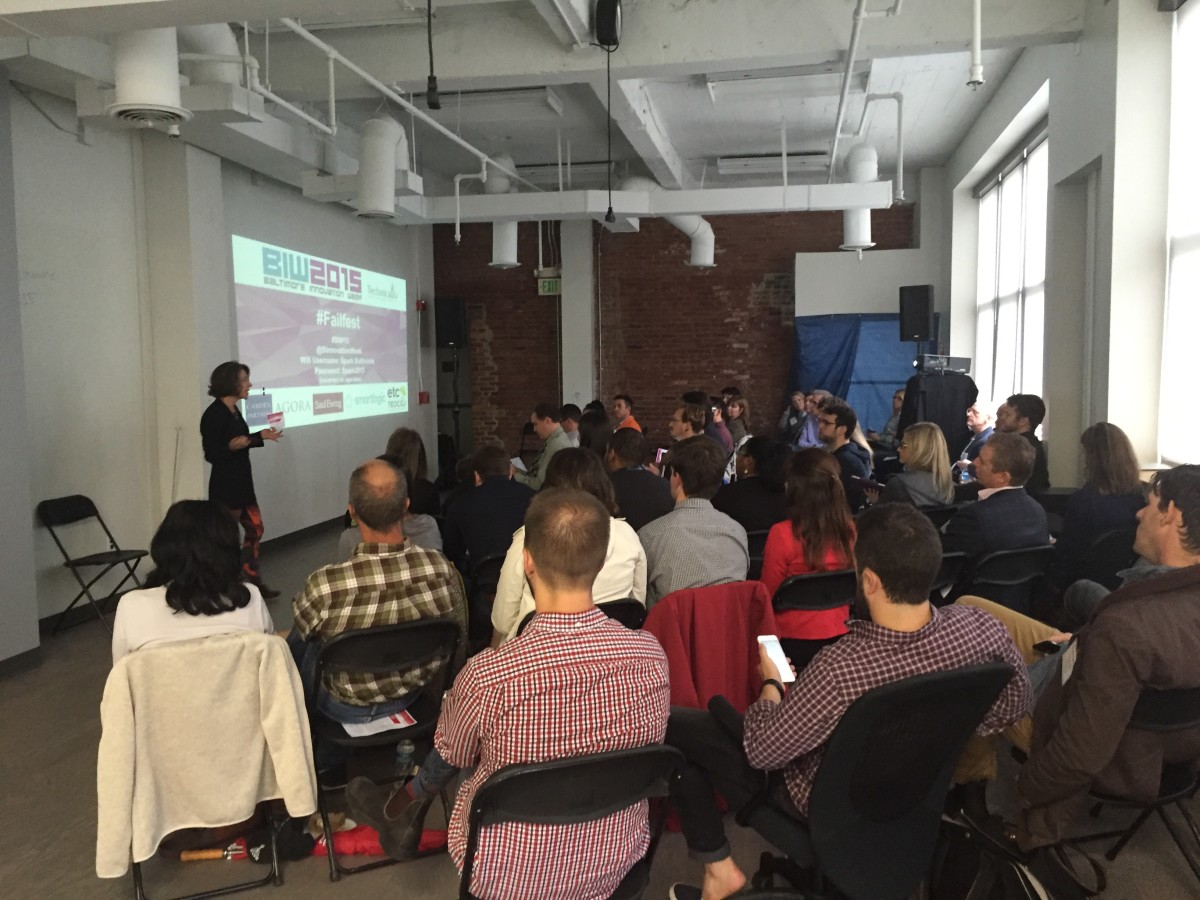“If you haven’t failed, you aren’t trying hard enough,” said Kinglet cofounder Jeff Jacobson.
In startup circles, failure is normally discussed in terms of business. Overall companies fail, or failures along the way help entrepreneurs learn.
That line of thinking was on display at #Failfest, which closed out Baltimore Innovation Week’s Business Day at the soon-to-open Spark coworking space in Power Plant Live! But since running a company often consumes all of a person’s livelihood, a few of the speakers opened up to discuss failures that stretched beyond business considerations.
Along the way, a few larger themes emerged about what the entrepreneurs learned from their failures.
1. Be humble
Mike Subelsky shared his experiences after washing out of becoming a Navy SEAL. He talked for the first time publicly about scars on his hand from holding on during the obstacle course, and opened up about struggling throughout his 20s. The experience has stayed with Subelsky as he manages employees at the adtech startup Staq and leads other Baltimore efforts.
“I do approach all these things with great humility because I was crushed to a speck of dust spiritually,” he said.
Subelsky offered another name for the event: Feedback Fest.
“It’s not that you want to fail, it’s that you want to get feedback as early as possible,” he said. The feedback is best when it comes from yourself, he said.
Patrick Rife also sounded a note for humility as the “greatest asset that any human being can possess.” In discussing time spent working on music. Standing in front of a single slide that said “YOLO,” Rife said he got into creative pursuits because he wanted “to figure out how to communicate with people in a way that was very important to me.” When he ended founding a photobooth company instead of becoming a rock star, he said he realized that it wasn’t about the art.
https://twitter.com/Jackaleen_A/status/650067070625951744
“What happened on the other side of that massive failure was the greatest success I could’ve ever hoped for because it gave me the opportunity to realize the medium isn’t exactly what it’s all about,” he said.
Lida Zlatic, CEO of foreign language learning-focused edtech startup ClassTracks, described the humility of admitting how much you don’t know. When first starting the company, she said she once went to a pitch competition even though she didn’t know what she was doing. But she won third place. “We were humble enough to say, ‘Hey, we have no idea what we’re doing,'” she said.
2. Take action
In a talk titled “The Paralysis of Analysis,” Greg Cangialosi talked about how overthinking can hold you back, both as an entrepreneur, and in life. Especially when running a startup where moving fast is valued, Cangialosi said not taking action can have serious consequences. He encouraged trusting your gut feeling. “Inevitably when we ignore our gut feeling things tend to not turn out so well,” he said.
ZeroFOX CEO James Foster told a few stories where he took action. After employees started to complain about how they don’t have offices, Foster said he gave up his own office, and moved into the open-floor workspace at the company’s Federal Hill headquarters. “Slowly, every executive started to move from their office as well,” he said.
Foster and Eyemaginations CEO Smitha Gopal both told stories of hiring people, whether it was too soon or too late. Foster advocates firing fast, and encouraging new employees to take a gut check about whether they want to be part of the ZeroFOX culture, or not. Gopal told tales of a couple of hires gone wrong. “We weren’t giving them direct criticism and feedback. They should know what’s about to happen, totally see it coming and realize that it’s not going to work,” Gopal said of people who were about to be fired.
3. Keep going
Terry and Belinda Kilby, who started drone photography outfit Elevated Element, started out before drones came in a box, so they had to make the drones themselves. They showed videos of early drone flights that didn’t go so well.
But over time, they were able to build drones that worked, and get traction with their aerial photography. They even quit their day jobs. Now, they’re releasing a second book and expanding the business into drone data analysis. “We stuck with it,” Terry Kilby said.







